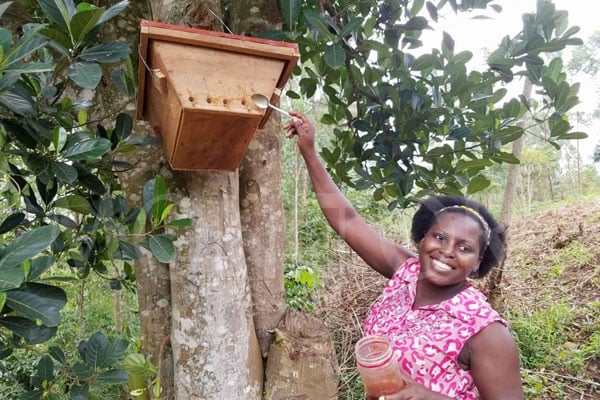Prime
Women thrive in beekeeping

Ms Jane Mugisa shows her bee hive in Labongo Sub-county, Masindi District. Photo/ISMAIL BATEGEKA
What you need to know:
- Ms Goretti Ayesiga, a businesswoman, says the demand for honey is growing, and urged people to embrace the business.
Several women in the sub-counties of Nyantozi, Labong and Mirys in Masindi District, are reaping big from beekeeping.
The women say, bee keeping is less tasking and can be done on a small piece of land.
Ms Allen Tulinde, a woman in the bee enterprise, says she does not regret engaging in the practice.
“As a woman, I don’t regret joining bee keeping. I have benefited a lot and yet I have been doing other things alongside it and yet there is enough market for honey throughout the country,” Ms Tulinde says.
She says she has 10 bee hives with each giving her between 10 and 15 litres of honey, where each litre sells at Shs20,000.
There are more than 260 bee hives in the three sub-counties owned by women.
She says she is able to save, pay schools and also look after the family. Ms Tulinde earns Shs1.5m after every six months.
Ms Agnes Asumputa, a resident of Labong Sub-county, says her 15 bee hives have enabled her continue looking after her family after her husband died.
Ms Asumputa says she has many customers from Masindi and Hoima districts.
“This business is not like others that require much time and money. Together with my family, we have benefits but the new plan is that we need to form an association such that we can get funding from the government and buy machines for processing honey,” she says.
Ms Goretti Ayesiga, a businesswoman in Masindi Town, says the demand for honey is growing, thereby urging people to embrace the business.
“People who are selling honey are making profits because the demand is high and supply is low. People should not despise this business because it is profitable compared to other businesses which are capital intensive,” she says.
The Bujenje County MP, Mr Kenneth Kiiza, calls for government support, especially with startup capital to ensure large scale production.
“Such women who are doing this business need to be given better training on modern methods in bee keeping, get financial support from the government to buy modern bee hives for better harvests at the end of the season since some are still using traditional methods of harvesting or using fire,”Mr Kiiza says.
Prof Samuel Majalija, a lecturer at Makerere University in the Veterinary and animals’ husbandry department, says people venturing into beekeeping need to invest in modern beehives to boost honey production because they have higher yields than traditional hives.
Beekeeping
Beekeeping is a comparatively low investment activity which requires only beehives, protective clothing and a few simple tools. It is also a sustainable agricultural activity.
In Uganda, honey production potential is enormous, estimated at 500,000 metric tonnes per year, but this potential has not yet been fully exploited.
The Ugandan Beekeepers Association estimates that only between 800 and 1,200 metric tonnes of honey are produced per year due to current lack of bee-stock.




